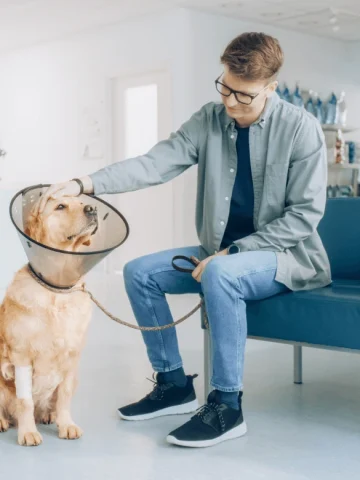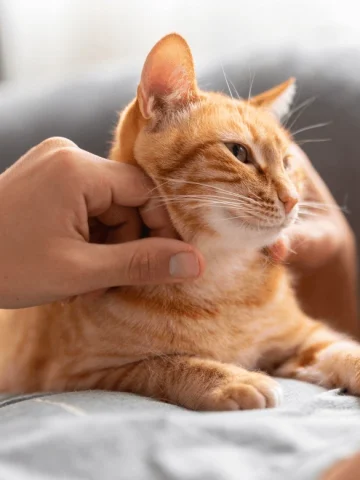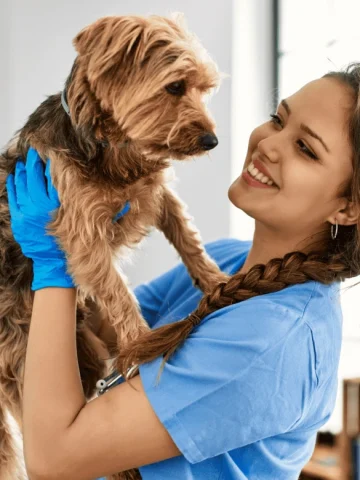
If you’re looking to take out insurance for your pet, you may be left scratching your head as to what is and what isn’t covered by the policy.
The point of insurance is to cover the cost of your pet getting sick or injured. Pet insurance companies will reimburse you for the cost of tests, surgery, hospitalization and emergency medical care if your pet experiences an unexpected injury or illness, such as a broken bone.
Usually, treatment costs are only covered for things included in the policy up to your annual coverage limit. Once you hit that limit, you’ll have to put your hand in your pocket and cover the rest of the costs yourself.
Usually, you’ll find that the more substantial the coverage on offer, the higher the price of the insurance policy.
Here’s a brief guide to what’s covered – and what’s not…
Things that are usually covered by pet insurance
-

Accidents
Sudden and unexpected accidents and injuries that happen to your pet are covered as standard by pet insurance policies. This will include things such as bone fractures or breaks, ingested foreign objects or toxins, bites, car accidents or lacerations.
Some insurance companies offer ‘accident-only’ insurance plans for pets. These cover treatment following an accident and nothing else. As a result, these policies are usually lower in price, as much less is covered.
-

New illnesses
Pet insurance policies will cover sudden and unexpected illnesses. These might include the onset of diseases such as cancer, parvovirus, heart disease, liver disease or arthritis.
-

Medication
Any medication prescribed by the vet is usually covered by pet insurance, as long as it’s not related to a pre-existing condition (see below).
-

Medical tests
Tests and diagnostics related to new illnesses or injuries — such as MRI scans, x-rays, blood tests and ultrasounds — are usually covered.
-

Alternative therapies
Increasingly, pet insurance plans now cover alternative therapies such as acupuncture, chiropractic care or hydrotherapy to help your pet recover from illness or injury. It’s often stipulated the therapy must be vet-approved to qualify for reimbursement.
Things that aren’t usually covered by pet insurance
-

Pre-existing conditions
This means any illness or disease your pet already suffered from prior to the start date of the insurance policy is not covered. Most insurance companies also stipulate that a waiting period (typically between 14 and 30 days) is completed once you take out the policy, during which time if your pet develops an illness, it’s classed as pre-existing and will not be covered.
This is standard practice among pet insurance companies. However, some insurers now offer coverage for ‘curable’ pre-existing conditions once your pet has been insured for a period of time, typically six months or a year.
-

Routine tests
Costs associated with routine tests or annual check-ups performed by your veterinary surgeon aren’t usually covered by insurance policies, unless you’ve added on a routine wellness plan, which is something most insurers offer.
-

Vaccinations
Standard annual vaccinations are not covered by pet insurance policies, unless you’ve added on a routine wellness plan, which is something most insurers offer.
-

Neutering
Pet insurance policies won’t cover spaying or neutering. This would be covered by a routine Wellness plan, which is something many insurers offer in addition to your pet insurance policy.
-

Breeding
The costs associated with breeding from your pet will not be covered by your pet insurance policy as standard. This includes pregnancy and birthing. Some policies offer breeding coverage as an add-on to the standard policy.
-

Grooming
Costs associated with grooming your pet, such as regular nail trimming, clipping or bathing, are not covered.
-

Cosmetic procedures
Any cosmetic work you decide to give your pet will not be covered by your policy. This includes procedures such as ear docking or tail cropping.
Trusted for over 10 years
We’ve been helping pet parents find the best pet insurance deals for over a decade. In that time we’ve given over 8.2 million pet insurance quotes, and been responsible for helping to insure nearly a million dogs and cats.








